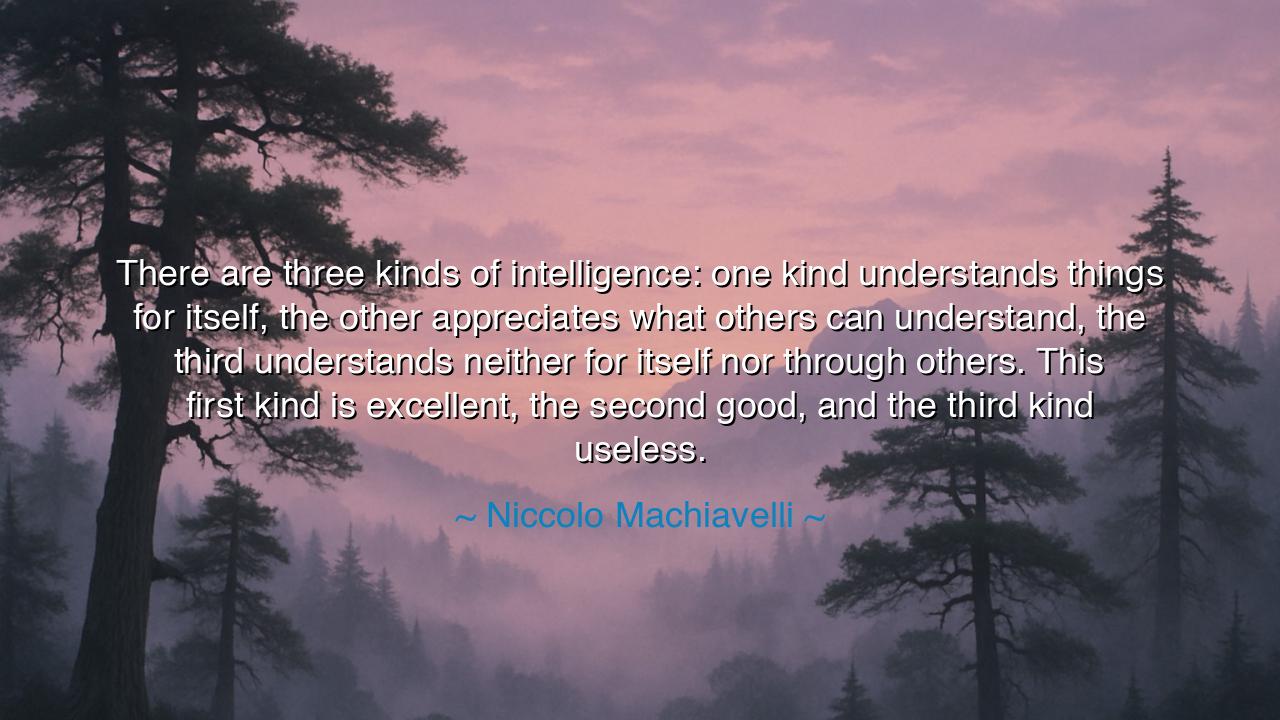
There are three kinds of intelligence: one kind understands
There are three kinds of intelligence: one kind understands things for itself, the other appreciates what others can understand, the third understands neither for itself nor through others. This first kind is excellent, the second good, and the third kind useless.






“There are three kinds of intelligence: one kind understands things for itself, the other appreciates what others can understand, the third understands neither for itself nor through others. This first kind is excellent, the second good, and the third kind useless.” So spoke Niccolò Machiavelli, the keen-eyed observer of human nature and power, whose words echo through the centuries like the measured strike of a philosopher’s hammer upon the anvil of truth. In this teaching, he divides the human mind into three forms — the wise, the discerning, and the blind — each defining the quality of one’s understanding, and thus the destiny of one’s life.
To understand for oneself is the mark of the excellent mind — the rarest and noblest of all intelligences. Such a person does not merely repeat the thoughts of others; they see truth with their own eyes, think with their own soul, and discover the patterns of the world by the power of their own reasoning. This kind of intelligence is creative, self-sustaining, and free. It gives birth to new ideas, new worlds, and new ways of being. These are the inventors, philosophers, and leaders who stand at the frontier of human thought, guided not by imitation but by vision. They are the fire-bringers of civilization, those who dare to see what has never been seen before.
The second kind of intelligence, though not original, is still noble and good. It may not invent truth, but it recognizes it when it shines before them. This person has the wisdom to listen, to observe, and to discern the minds greater than their own. They may not create the path, but they can follow it with understanding and faith. Such intelligence is the strength of a loyal advisor, a faithful student, or a prudent ruler who listens to wise counsel. For as Machiavelli himself taught in The Prince, a wise leader must know how to judge the quality of others’ advice, even if he cannot produce it himself. It is better, he says, to know that you do not know — for humility in learning is the first step toward wisdom.
But the third kind of intelligence — the one that neither understands for itself nor appreciates understanding in others — is useless, and even dangerous. This is the intelligence of the ignorant and the arrogant, of those who are blind yet believe they see. They neither think deeply nor learn from those who do. Their pride blinds them to wisdom, and their ignorance multiplies their folly. Such minds stumble through life, repeating the errors of others, destroying what they cannot comprehend, and blaming fate for their failures. They are like ships without a compass, tossed endlessly by the winds of chance.
History offers a thousand mirrors for Machiavelli’s truth. Consider the tale of Marcus Aurelius, the philosopher-emperor of Rome. He belonged to the first kind — a man who thought for himself, who ruled not by impulse but by reflection. His writings in Meditations reveal a soul in conversation with truth itself, seeking reason amid the chaos of empire. By contrast, his son Commodus, who inherited the throne, embodied the third kind of intelligence. He neither learned from his father’s wisdom nor possessed any of his own insight. His vanity and recklessness plunged Rome into corruption and decay, proving that even the greatest empire can fall when led by the mindless.
The lesson, then, is as timeless as the dawn: cultivate understanding — first in yourself, then through others, but never let ignorance rule you. The highest form of wisdom is to see with your own eyes, but the next is to recognize the light in another’s vision. Listen to the wise, but think for yourself. Be neither the fool who knows nothing nor the slave who borrows every thought from others. Let your mind be a lamp unto itself — kindled by curiosity, tempered by humility, and fed by the oil of reflection.
In your daily life, practice this: read deeply, listen intently, and question everything — not with cynicism, but with the hunger to understand. When you hear truth, do not let it pass you by; let it take root, and test it with experience. And when you find your own insight, hold it with courage, even if the world calls you mad. For those who understand for themselves shape the future, those who learn from others preserve it, and those who learn from neither are swallowed by it.
Thus remember Machiavelli’s wisdom: the excellent mind illuminates, the good mind reflects, and the useless mind darkens its own path. Choose, then, to be among the first two — to see, to listen, to grow — for in the kingdom of the mind, clarity is power, and he who thinks truly rules not only himself, but the destiny that follows.






AAdministratorAdministrator
Welcome, honored guests. Please leave a comment, we will respond soon